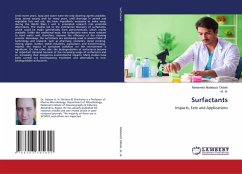Until recent years, soap and water were the only cleaning agents available. Soap served society well for many years, until shortage in animal and vegetable fats and oils, the basic ingredients necessary to make soap, during the World Wars I and II, prompted research into potential alternatives. The studies led to the commercial discovery of surfactants, which could be made synthetically from petrochemicals, which readily available. Unlike the traditional soap, the surfactants were more resistant to hard water and, therefore, improve the efficiency of the cleaning process. Nowadays, the surfactants are extensively used in several fields of technology and research, such as pharmacy, cosmetics, metal working, mining, paper, leather, textile industries, agriculture, and biotechnology. Indeed, the impact of surfactant pollution on the environment is significant. On the other side, the biodegradation of surfactants became an important demand because of the increasing usage of surfactants and so, increasing their dangerous environmental impacts. Many studies have been carried out encompassing treatment and alternatives to non-biodegradable surfactants.
Bitte wählen Sie Ihr Anliegen aus.
Rechnungen
Retourenschein anfordern
Bestellstatus
Storno








